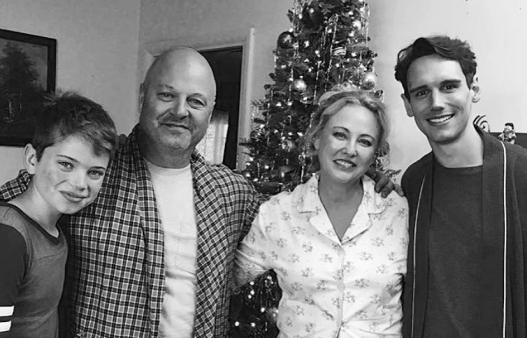 |
| The family unit in 1985 |
Black and white dramas about AIDS set in small town religious communities may not be the kind of thing that grabs the attention of awards voters, but Yen Tan's 1985 has attracted an impressive amount of critical support, especially given its low budget. Starring Carol alumnus Cory Michael Smith, with Virginia Madsen, Michael Chiklis and Jamie Chung in support, it's one of the best ensemble pieces of the year. Smith's Adrian is a young man returning to his family home for Christmas, trying to reconcile himself to their strict religious values as they try to cope with the reality of his sexuality, something they hesitate to mention. Adrian is dealing with a terrible personal loss and it's really the love between the characters - stronger than their conflicts - that makes the film stand out. Director Yen Tan agreed to answer some questions in the run-up to the film's release in the UK.
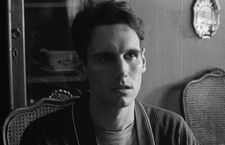 |
| Cory Michael Smith as Adrian |
Jennie Kermode: 1985 is clearly connected to your previous short of the same name but also has something in common with your 2008 film Ciao, in that both feature men dealing with the loss of a partner. Do you feel that too little time in cinema is devoted to exploring men's experiences of grief in a sensitive way (without focusing on anger or a desire for revenge)?
Yen Tan: We could always use more time in cinema to explore these experiences in a way that is not just sensitive, but empathetic and deeply relatable. I tend to use myself as a barometer, in that even when I write about men unlike myself, I need to feel like I can connect with their journeys thoughtfully.
JK: How do you feel about all the attention that '1985' is getting in the run-up to the end of year awards? Did you feel that this film was going to break through like this when you were making it?
YT: I'm very grateful for the attention 1985 has received by far. It has certainly surpassed my expectations. On paper, it has quite a bit against it: an AIDS drama. That's shot in black and white! Not the kind of film I'd expect festivals to program in prime slots (i.e. opening, closing, centerpiece, etc.), much less play to sold-out crowds. Every time I return to the theatre for a post-screening Q&A, emotions in the air always run high. In that regards, perhaps the attention isn't surprising.
JK: Desiree Akhavan once remarked to me that a studio exec told her she couldn't have a character who was both Iranian and bisexual because that would mean there were two 'issues' in one film. You've spoken about how being a queer Asian may have made things more difficult in your career. Do you think that people in more than one minority group routinely face additional challenges, and has that affected the projects you've been able to get support for? Did it influence the casting of Jamie Chung as the white hero's maybe-ex-girlfriend in 1985?
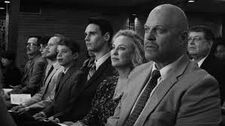 |
| Seeking salvation in 1985 |
YT: It has been challenging for me for a while, but I wasn't fully aware of the challenges when they were happening either. I didn't know what was micro aggression back then, or understood phrases commonly associated with Asian Americans like 'model minority' and 'bamboo ceiling'. Post presidential election in 2016 has been an awakening. Being able to hear what other people like me experienced helped contextualised what I faced, so now I can articulate it a lot better when I find myself in the same situation. Issues of underrepresentation are discussed a lot more in the mainstream today, too, which helps a lot. The casting of Jamie Chung remains a problematic part of our behind-the-scene story: many agencies pitches white actresses for the role, even though Carly was always clearly written as Korean American on the script. I then realised that in 2016, which wasn't that long ago really, many talent agencies didn't have enough Asian actors in their roster.
JK: 1985 stands out to me because it takes a familiar format - queer person with strict religious parents - and focuses on the love that binds the family together rather than making a show of the conflict the characters experience. Did you deliberately set out to do something different in this area, and did you find it more challenging to develop the story in that way, both as a writer and as a director?
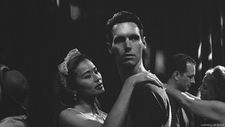 |
| Dancing with the past |
YT: Yes. The intent was to set up the family in a seemingly archetypal away, then gradually peel each character's layers to reveal who they are over the course of the story. It didn't make it more challenging, because this is the way I wanted to present these people.
JK: Why did you choose to shoot in black and white? Was the historicity of the period a factor - placing what was happening in 1985 in something that feels more firmly like the past?
YT: I love that black and white evokes period, yet looks timeless. It's not what we associate the Eighties with, but it feels like the right aesthetic given how many people who were impacted by the epidemic remembers those days in a very stark way. Black and white also narrows our visual focus on the characters; we didn't want to make a film where nostalgia was emphasised on the wardrobe, décor, etc. One of the films we used as an inspiration was Ken Loach's Looks & Smiles, which was also set in the Eighties.
JK: Cory Michael Smith gives a very quiet, contained performance in the lead. Did you feel that this provided a better means through which to explore the enormity of what HIV and AIDS did to the gay community in New York in that period?
YT: I think so. I knew that he didn't have to verbally convey a lot of information because I trusted that the audience will understand the context. We never had to say 'gay' or 'HIV/AIDS' in the entire film. Yet, it's always in the back of the viewer's mind. What Cory did masterfully was expressing the weight of that experience and the way he internalised his trauma.
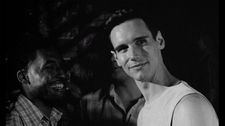 |
| Finding a home in New York City |
JK: How did you approach developing the portrayal of Adrian with an actor who hadn't actually been born at the time when the film is set? Did Cory prepare by himself or did you work more directly with each of your actors?
YT: Cory did a lot of homework himself. He talked to friends who experienced that era and also read up about it. @theaidsmemorial on Instagram was a frequent source for him.
JK: The actors work incredibly well together as a group. Did you have extensive rehearsal time before shooting?
YT: Since we're a super low budget indie, there was no rehearsal time. Actors would show up, we block the scene, which usually happens really fast, and then when everyone feels ready, we'll shoot a take. All of them have had extensive television experiences, so they're used to not having a lot of prep time. In that regards, they're seasoned enough that I didn't have to worry about not being able to rehearse extensively.
JK: To me, the real standout is Virginia Madsen - although I haven't yet finished my awards viewing, I find it hard to imagine giving my Best Supporting Actress vote to anyone else this year. I was really impressed by how much character she managed to convey even when in the background of scenes. How did you work with her to help her achieve that?
YT: I'm glad to hear that! We talked a lot about it before production. I don't remember us having to talk about it much while we're shooting. I just trusted that she had her way of figuring it out. In that sense, I was right. There wasn't much I wanted to add to what she was already giving me.
JK: You've worked in many different roles in the film industry and now you finally seem to be getting the attention you deserve. Where do you hope to go from here?
YT: Being able to make another film is always a privilege. It's such a tough and unpredictable business that I'm sometimes baffled that I held on to it as long as I have. 1985 was an important reminder that I should always tell stories that come from a deeply personal place.
1985 is released in UK cinemas on 14 December.





















